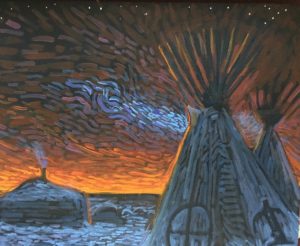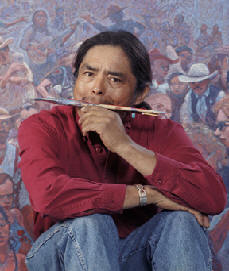This is part two, continued from last week’s issue of Flagstaff Live.…
 The wind blew all through the cold night. The protective covering I rigged over our shared tent flapped frozen against the outside. I was too tired to even be bothered by it at all. I laid there hoping I didn’t have to go empty my bladder soon. Fortunately, the sleeping bag was designed for this climate. I hoped my tent partner, Jasmine, was warm enough as I covered her gently in an extra blanket. A person I have never met before from Brooklyn was sharing her tent. It was a warm space in a brutal North Dakota winter.
The wind blew all through the cold night. The protective covering I rigged over our shared tent flapped frozen against the outside. I was too tired to even be bothered by it at all. I laid there hoping I didn’t have to go empty my bladder soon. Fortunately, the sleeping bag was designed for this climate. I hoped my tent partner, Jasmine, was warm enough as I covered her gently in an extra blanket. A person I have never met before from Brooklyn was sharing her tent. It was a warm space in a brutal North Dakota winter.
In the early morning, the wind howled incessantly as the drums began. The rhythm soon joined by voices as the Lakota singers sent out vibrations into the pre-dawn’s frozen landscape. What a beautiful collage of harsh elements and humans’ will to petition in faith.
Another morning’s greeting at Oceti Sakowin, the “city” of the Water Protectors in Cannonball, N.D. I was up early to place my corn pollen in prayer toward the rising sun. Jasmine was already up as well, mopping the mess hall’s ceiling of condensation. The fire had gone out during the night in the large Quonset hut that served as our camp’s kitchen and dining area. We started the fire blazing as other campers started trickling for Yeego’ Coffee, Yeego’ (brave on), a cheering mantra in Diné word.
After a hardy breakfast, I charged up my cell phone on one of the many solar charging stations. The drone of the plane began as well. All day and long into the night, our receptions were disturbed. Other drums began beating as more voices awoke the camp.
Bundled up figures emerged from each camp as morning greetings were exchanged. After chopping and stacking firewood, I made my way up to Media Hill to send out updates. That was the one place we could receive and send—I don’t know how it worked out that way. I met a group of Maori supporters and we breathed in each other’s essences, touched noses and blessed one another. These beautiful people gifted me with a sacred stone necklace made of jade.
The hill to the north was lined with police and their armored vehicles. A show of force, taunting. We thrived with and in peace in that camp. Some of our young people wanted to engage with them but the elders’ voices of reason was still heard. Caravans were made to Bismarck to march in solidarity for all water users. The time I spent in the city was quite nice. I expected a bit of hostility but none materialized. We looked camping scruffy and brown, but met with little notice.
I spoke with a young man doubting himself after witnessing the horror on the bridge the night before. I spoke with him at length about human fallibility and how, in hindsight, it’s a gift of teaching moments. His weight lifted. Everyone looks after the other.
I walked with a Diné brother, out to gift the river with pollen. Each step through the tall grass, you know there was a sniper’s bead on you. We prayed with the river. We knelt on the ice-crusted bank. I saw them on the ridge.
The cold blew through you with ease.
Music was almost constant, as pure as the love and support you felt from every person. I swayed to the music of known artists, and received chocolate from strangers—dark chocolate.
Thanksgiving, as ironic a day it was, still fed us in spirit and body. Healthy prepared food by a Diné chef from Minneapolis did us great. The real words and songs from elders ushered in the serving of food. The elders, we were served first by the young ones. It was a great moment to be an elder. Though, I am introduced as the youngest elder.
The medical camp also included herbal healing and massage yurts, where I received the most memorable bodywork as the Water Protectors crossed over en mass to Turtle Island. I chose to stay calm. Diné Water Protectors were well represented as we numbered in the hundreds from all over Dineh’tah’ (Diné land between the Four Sacred Mountains).
On Thanksgiving Day, we were invited to the Diné sheep camp where we were fed fresh mutton/corn stew, fry bread, Navajo herbal tea, and blue corn meal mush. I don’t even eat this traditional style back among my people; I had to come up to North Dakota to do it. I grinned at the irony.
The freezing cold makes the body tire out completely. As the day of thanks ended, I was so exhausted from the cold and tryptophan. I believe everyone was fed the traditional Thanksgiving meal: Bison stew and other supporting cast of culinary delight. We did give gratitude to the great spirit of the Universal Kindness. Below the iron gaze of the police there on the hill, we gave our thanks not for the pilgrims, but for our strength, perseverance, and hopes for an outcome acknowledging our tribal sanctity.
The bitter cold wind blew across the camp as the sun sat on another day at Oceti Sakowin, by the Cannonball River where we chose to take our stand.
We fell into our tent and fell deeper into a well-earned slumber. The memories of faces and conversations of the day receded gently into calmness.
The night crept into every habitat below the blanket of starry, starry night.
We fell asleep undisturbed despite the noise of the flapping frozen tarp on our tent, despite the drums and the threats just over the hill. The howling wind blew all night. I dreamt warming dreams.

